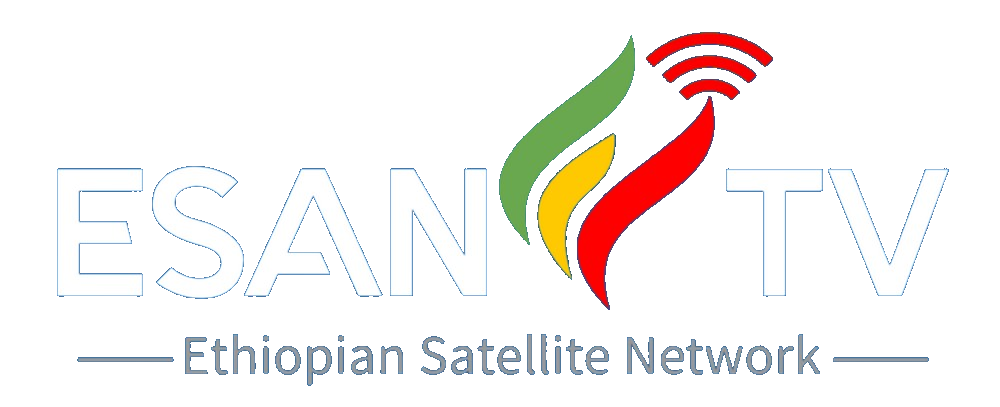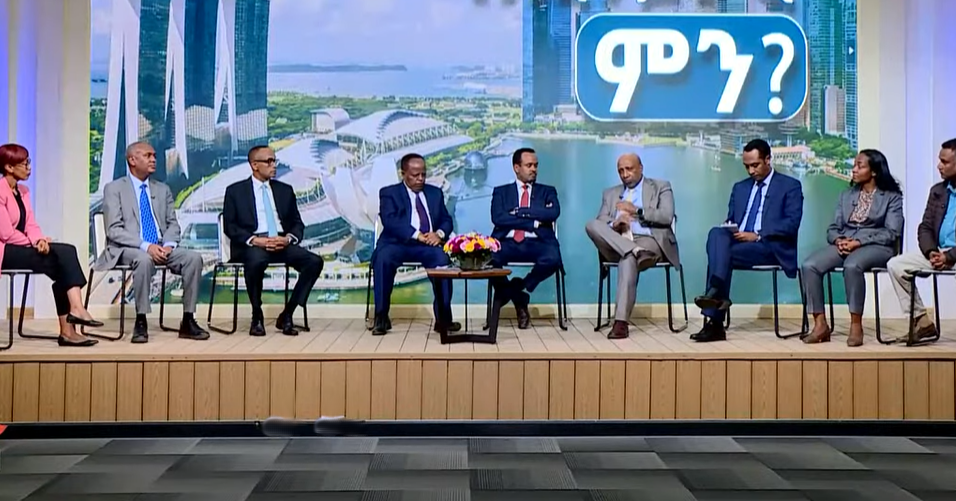By Abebe Gellaw
A group of Abiy Ahmed’s yes-men and entourage recently staged a two-part televised spectacle on the state-owned EBC. The chat was to share the “lessons” they claimed to have learned from their two-night stay in Singapore. But their chitchat was, to say the least, cringe-worthy.
The “ministers”, hosted by Abiy Ahmed’s palace chronicler, Billene Seyoum, notably included Berhanu Nega, mediocre propaganda man and bedtime storyteller Daniel Kibret, and “minister of peace” Binalf Andualem. Peaceless Ethiopia is one of the only five countries in the world, along with the Solomon Islands and Papua New Guinea, to have an Orwellian ministry of peace, a tool of repression.
Like kids in a candy shop, their clamors mainly focused on the mundane—the most colorful things of attraction. Oohing and ahhing, they eagerly took turns describing how pretty the tiny city-state was, mentioning the beauty of the plants, the flowers, the apartments, the zoos, the clean streets, and the glass towers. Among the crowd, a former freedom fighter-turned-sidekick of Abiy stood out as the most unsightly, lined up with the sycophants’ club, slowly pontificating and expressing exaggerated awe at something so prosaic.
To begin with, unlike Ethiopia, Singapore is often praised for its effective and unifying leadership, which is credited for spurring rapid economic development. In Ethiopia, the ruling party and numerous ethnic “liberation” fronts incite division and hatred continuously, whereas, in Singapore, incitement is treated as sedition. Every citizen identifies as Singaporean first. Under Lee Kuan Yew’s leadership, social harmony and national unity were placed at the heart of stability. Corruption was eradicated, and administrative structures were established based on meritocracy rather than ethnicity. Despite being labeled a “benevolent dictatorship,” Singapore’s strategic location, as one of the world’s busiest ports, small size, and effective policies have contributed to its success story. It is as simple as that. To understand this fact, reading a paragraph or two in a newspaper article could have saved time and resources for the tyrant’s entourage and the poor nation facing severe foreign exchange crunch.
How could these individuals miss the elephant in the room? The Ethiopian ruling party is designed to be a ruthless force of evil. Since 1991, ethnicity has been allowed to permeate every aspect of life. Let alone social cohesion and harmony, national unity and social fabric is deliberately destroyed to give way to divide and rule. Instead of a government that works for them, the people face a ruling tyranny and all sorts of extremist ethno-fascist groups that unleash their violently destructive powers upon the defenseless and most vulnerable sections of society, including children and women, throughout the country. Mass displacement, mass killings, mass detentions, and the insane destruction of public and private property, including schools and health centers, occur on a daily basis. Sadly, the ruling party is the worst perpetrator of such heartless crimes and looks the other way whenever the nation bleeds and weeps.
Abiy Ahmed, who rose to power as a self-anointed reformer, has worsened thesecrises, affecting millions of poor people more than ever before. On the eve of the war in Tigray, which has erased the little progress made for decades, he declared war on the people of Amhara, escalating death and destruction to biblical proportions. Yet, he and his buffoons preach prosperity and development 24/7. Is it really necessary to travel to Singapore and South Korea to see that the regime is driving Ethiopia deeper into abject poverty with each passing day? Aren’t the criminal activities of those in power the antithesis of development? What is even more shameful is to go around and beg for money from foreign powers to foot the exorbitant bill of waging wars, buying bullets and drones.
It makes no sense to talk about lessons learned when none are relevant for Ethiopia. In our case, tyranny and criminality have been comfortably cohabiting for decades. Is it sensible for their “excellencies” to talk about the delusions of prosperity in a country where nearly 9 million students, i.e., 43 percent of the total student population, have been forced out of school? The minister of miseducation, whose performance in the last few years is less impressive than an F grade, is more visible than anyone in the room due to his background and expectations. Was he really serious about sharing the deep lessons he gained in Singapore, where education is the driving force of its developmental state? The irony is truly astounding.
The sad fact is that Ethiopia is a rich country with countless missed opportunities. While being rich in history, culture, natural resources, including abundant water, land, and manpower, it is condemned to paddle in the quagmire of poverty because of viciously malevolent and corrupt tyranny, the very opposite of the Asian Tigers. For Abiy and his goons, clinging to power at any cost, tormenting and destroying a poor nation, and causing incalculable destruction is considered the shortcut to development and prosperity. This situation raises serious concerns.
With an area of 728 square kilometers and a population of six million people, Singapore is almost the same size as Addis Ababa in both area and population. In contrast, Ethiopia, with a land size equivalent to Germany, France, and England combined (i.e., approximately 1.1 million square kilometers and over 1,511 times the size of Singapore), has immense potential for development. However, the reason this nation shamefully survives on food aid is due to myopic and idiotic leadership. This applies today as it did over three or four decades ago. That is why I found the chitchats and small talks of the stunted enablers of tyranny quite nauseating.
For these people, the best lessons are readily available, not in Singapore or Korea, but in their backyards. The unmissable lessons are lying under their feet. With open hearts and minds, they should visit the millions of internally displaced fellow Ethiopians. They should see the pile of charred bodies of children and women burned alive by drone and artillery attacks by the regime. They should visit the concentration camps where hundreds of thousands, including members of parliament and city councils, are illegally held and tortured. They need to have the courage to ask the reformer-turned-tyrant why 9 million school children are out of school. Why have their schools and clinics been destroyed? Do they really have the courage to learn why Ethiopia is on the path to Armageddon, not rapid economic development? Being part of a criminal gang, pretending not to have seen and heard what is going on, and having humane hearts and brains that function well with a moral compass are entirely two different things.
Sycophants and opportunists have played a crucial role in the rise and consolidation of tyrannical regimes around the world. In Ethiopia, from Mengistu to Meles, from Meles to Abiy, reinforcing the power of dictators, suppressing dissent, creating codependency, and institutionalizing destructive tyranny has been the role of the advantage-seekers.
Historically, Ethiopia has witnessed all these. The enablers’ actions and motivations, driven by personal gain and fear, help create an environment where tyrannical behavior can thrive, often at the detriment of the welfare and future of the nation. The constantly clapping rent-seekers make the epic rise and rapid fall of the inept tyrant clinging to power partly possible by making it seem like every wrong is right.
Sycophants and opportunist enablers are bolstering the destructive tyrant’s sense of greatness and “divine” right to misrule by continuously praising his actions and decisions, creating a false sense of infallibility. A recent case in point is the publication of the tyrant’s useless speeches that contradict his actions in the form of a book by Billene Seyoum and Daniel Kibret. Such an echo chamber isolates the leader from the real state of affairs, making him increasingly reliant on such servile loyalists for validation and support. The reinforcement emboldens him to adopt more bloody measures, knowing he has the unwavering backing from his inner circle. Killings and destruction have has become a norm. Additionally, these enablers actively work to suppress dissent by intimidating or discrediting critics and opponents, thereby silencing opposition that could challenge the ruler’s criminal behavior.
Unlike the People’s Action Party in Singapore, Abiy Ahmed’s sham “Prosperity Party” has exacerbated the country’s problems by waging endless wars, deepening ethnic divisions, and committing crimes against humanity at scale as a means to maintain control. The destruction wrought by these tactics is self-evident in the country’s ongoing conflicts and humanitarian crises. However, for the sycophants in power, these issues are of little concern. Their primary focus remains on pleasing their boss, securing their own positions and benefits, even as the nation suffers and burns to the ground. This willingness to overlook widespread state-sponsored terrorism, criminality, destruction, and division underscores the deep-rooted corruption and moral bankruptcy that sycophants allow tyrannical behavior to persist and thrive in Ethiopia.
In any case, Ethiopia isn’t Singapore, as the nation has not been fortunate enough to have mature, responsible, and visionary leadership. There’s no need to bluff on TV about non-existent and irrelevant lessons from Singapore. Being part of a criminal mafia group unleashing tyranny is not something to be proud of. That is why they should hide their faces in shame. Commonsense is much worthier than televised buffoonery and chicanery.
The focus on colors, fake images, beautification, and aesthetics, besides comparing apples and oranges, cannot cover the reality of apocalyptic ruins, ashes, dead bodies, and maimed limbs beneath the surface. Well-managed Singapore is not the same as misruled Ethiopia. I hope this can be a bitter but better pill to swallow than savoring a fantasy world, far from the grim realities of Ethiopia.






